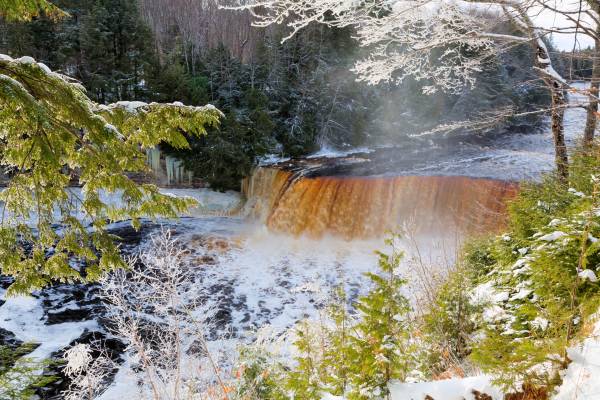Dedicated RV campers don’t let a little snow and freezing wind stop them from enjoying the freedom of a camping trip! With the wintery season ahead of, and snow just around the corner, it’s time to start thinking of where to go! If you’re planning your next cold-weather vacation, we have a few recommendations for your next Midwest winter campsite.
Read on to learn about some of our favorites here in the Midwest to help you plan your trip and get the most enjoyment out of your winter camping!
Safety First: Before You Plan Your Winter RV Camping Trip
If you’re new to camping or to the idea of winter RV camping, it does come with some caveats! Even if you’re a veteran of the type of cold Midwest winters can bring, you need to be prepared or you won’t get to fully enjoy your trip!
Before you head out on the road, we recommend you read these important cold weather RVing tips to get started on your first winter RV trip. They’ll guide you through the most common pain points of camping in the winter, along with ways to prepare your RV to make it safer and more comfortable even when the temperatures hit below zero!
Tahquamenon Falls State Park – Michigan

Boasting an area of nearly 50,000 acres, the Tahquamenon Falls State Park is a popular destination all year-round. The centerpiece of this beautiful state park is the Tahquamenon River and several waterfalls within it. Starting from the Upper Falls, which is one of the largest waterfalls this side of the Mississippi, you can witness the awe-inspiring 50-foot drop that brings thousands of visitors every year!
Of course, if you’re visiting in the winter, everything becomes that much more breathtaking. The snow-covered trees surrounding the river and throughout the park, along with the gorgeous river, present a winter wonderland straight from your dreams.
If your RV is a toy hauler, don’t forget to bring along a snowmobile or two. In addition to all the fun activities, this state park has trails designated for snowmobile use when there’s at least 4” of snow!
Maumee Bay State Park – Ohio

Right around the corner from our home in Sylvania, Ohio is the beautiful Maumee Bay State Park. It’s a favorite for our local campers, and if you’re in the area, it’s one you shouldn’t miss out on! Whether for an extended stay or just a weekend visit, the park provides spacious RV areas with on-site electricity ready to keep you warm during a chilly winter day.
It doesn’t matter what you’re looking for, Maumee Bay State Park has it all:
- Beachfront view
- Comfy Campsites
- Special events all the time
- Beautiful natural views
- Great dry camping or hook-up experiences
There’s plenty to do around the park – especially if you love to wander. Plan to bring gear to enjoy winter activities like:
- Cross-country skiing on designated trails
- Ice Skating
- Sledding
And since you’re staying overnight, you’ll get to enjoy the incredible view of the sun setting over Lake Erie.
French Creek State Park – Pennsylvania

This nearly 8,000-acre park is nestled in the heart of Pennsylvania, not too far from Philadelphia. It’s the largest area of contiguous forest between Washington D.C. and New York City, making it a favorite getaway for nature lovers throughout the east coast and Midwest areas.
The natural landscape of French Creek State Park has something for everyone, from wetlands to open fields to lakes and forests, making it great for hikers and travelers to experience much of what the natural area has to offer. Wildlife thrives throughout the park, even during the winter season, for those of you who love to camp to watch animals in their natural habitats!
Open every day of the year, with the large campground open from March through January. Most of the sites have electrical hook-ups, though depending on visitor volume, you may have to make use of the public charging stations between periods of camping without direct hook-ups.
Mirror Lake State Park – Wisconsin
In the heart of Wisconsin, Mirror Lake State Park offers a serene escape for snow campers seeking tranquility amid a winter wonderland. As the name suggests, the campground encircles the calm Mirror Lake, whose still waters reflect the snow-draped trees and skies, creating a picturesque scene.
As winter descends, the snow transforms the landscape into a peaceful retreat where the quiet is only broken by the crunch of snow underfoot. The snow-covered pines and oaks add a touch of magic to your camping adventure.
For those with a love for winter sports, Mirror Lake State Park does not disappoint. The park boasts well-groomed trails for snowshoeing and cross-country skiing. And if snowmobiling is more your speed, there are designated trails that wind through the snow-clad forests, offering an exhilarating ride through the winter scenery.
Ludington State Park – Michigan
Stretching along the shores of Lake Michigan, Ludington State Park is a delightful destination for snow camping enthusiasts. The park covers 5,300 acres of scenic landscapes including forests, dunes, and wetlands – all of which take on a different charm under a blanket of snow.
The icy blue waters of Lake Michigan contrast beautifully with the white snow, creating a stunning backdrop for your camping adventure. The serenity of the snow-covered beach is a sight to behold, offering a unique snow camping experience.
Ludington State Park is well-equipped for winter fun. With miles of groomed trails, snowshoeing, and cross-country skiing are popular activities among campers.
Snowmobiling is also available, with trails leading through the varying landscapes of the park, each turn revealing another picturesque view.
Whitewater State Park – Minnesota
Tucked away in the blufflands of southeastern Minnesota, Whitewater State Park is a splendid choice for a snow camping adventure. The Whitewater River meanders through the park, its waters continuing to flow even as the surrounding landscape is enveloped in snow.
The towering bluffs and deep valleys become even more dramatic with a dusting of snow, adding a sense of wonder to the already beautiful scenery. The snow-covered hardwood forests invite exploration, with the promise of awe-inspiring views from the bluffs.
Winter activities abound in Whitewater State Park. The trails welcome snowshoers and cross-country skiers, offering a peaceful retreat into nature.
For a faster pace, nearby snowmobile trails provide the chance to race through the snowy vistas, making your snow camping experience a thrilling adventure.
Contact RV Wholesale Superstore
The professionals at RV Wholesale Superstore are ready to help you find the perfect RV for you and your family. Visit us in-person at 5080 W. Alexis Road, in Sylvania, OH or call us at (419) 786-1126
Connect with us on Social Media!




